
Admittedly I seldom venture beyond the historic center of metro Louisville unless it’s time to drive to the airport from New Albany (speaking of which, why are we too dumb for light rail?) to fly to Europe, and as such, it completely escaped me that Oldham County Brewing Company closed at the gold course on November 1, ending one of the more unique arrangements to vend craft beer—The Beer Hunter meets Caddyshack—albeit with a plan by the brewery’s reconstituted ownership to begin anew elsewhere.
Eleanor Tolbert has the relocation story at Louisville Business First: Oldham Brewing Co. to move near Old Louisville, change name.
Inside Job Brewing Co. is seeking a zoning change for a building at 1031 S. Sixth St. The company was formerly Oldham Brewing Co., which is moving from Prospect to the Limerick neighborhood.
Tolbert also gets the byline for this: Trellis Brewery to open in the Smoketown neighborhood.
Trellis Brewing is planning to open at 827 Logan St. on the Merchant’s Ice Tower property. The 7,500-square-foot building on the property was a former ice storage for the tower, said Trellis Brewing Co-founder Kyle Jahn.
(snip)
Trellis Brewery will focus on grain-forward, clean lagers to highlight the unique flavor of Kentucky-grown barley, rye, and wheat through a partnership with South Fork Malthouse from Cynthiana, Kentucky, a news release said. It will also offer other modern IPAs and stouts.

In 1987 I spent two weeks in Budapest, the capital of Hungary. As mature readers will recall, it was a Warsaw Pact nation at the time, even if a gradualist program of economic reforms colloquially referred to as “goulash communism” enabled a certain degree of private enterprise.
Boundaries were being pushed in Hungary, but there were limits. Larger enterprises remained nationalized; smaller retail and service businesses might be privately owned, or not. No one could foresee these considerations being rendered moot by 1990.
The charms of travel in the East Bloc during this period were three-fold for me.
Foremost, while communism may have been a shared imposition, the national histories, cultures, and languages behind the Iron Curtain varied and were uniformly fascinating.
In addition, the cost of living for a western tourist was ridiculously inexpensive, even if I generally resisted the temptation to splurge.
As an added bonus, my stated preference for Krakow over Cancun befuddled my fellow Americans, most of whom would have chosen Corona over Pilsner Urquell. I gloried in being different, and franky, still do.
There was much to experience in Budapest that June in ’87, and I fell into a daily habit of taking long walks augmented by public transit, seeing the city and compulsively snooping into shops and stores, looking for knicknacks, bottled beers and picnic edibles (read: wonderful Hungarian salami, cheese and loaves).
I usually dined at midday at one of the workers’ cafeterias (each municipal district had at least one) for a big, inexpensive meal of soup, a main course and dessert with a beer or three. My forager’s bounty would be reserved for a lighter spread later in the evening.

Somewhere, perhaps in the queue for tickets to the Genesis concert at the national soccer stadium, I ran across an American named Mike. He was an artist from St. Louis studying in Budapest and great company for a few days.
Mike introduced me to a dining establishment located behind the American embassy in downtown Pest called Czarnok Vendéglő (an “inn”), enticing me by saying it served draft German beer.
My brain, acclimated to imports common in the States, immediately begain pondering the more familiar brands like Beck’s and Paulaner. When I met Mike for dinner at the Czarnok Vendéglő following an afternoon spent perusing western newspapers at the embassy’s reading room, the German beer in question was revealed to be from the city of Karl Marx Stadt, formerly (and now again) Chemnitz—in communist East Germany, of course.
This golden, hoppy lager beer from the GDR was just fine, and the töltött káposzta (cabbage rolls) even better.
In 2020 Czarnok Vendéglő celebrated its 40th anniversary, and looking at the Google street view, it amazed me that the somewhat anemic tree could be almost unchanged after 33 years (see my cover photo from 1987).
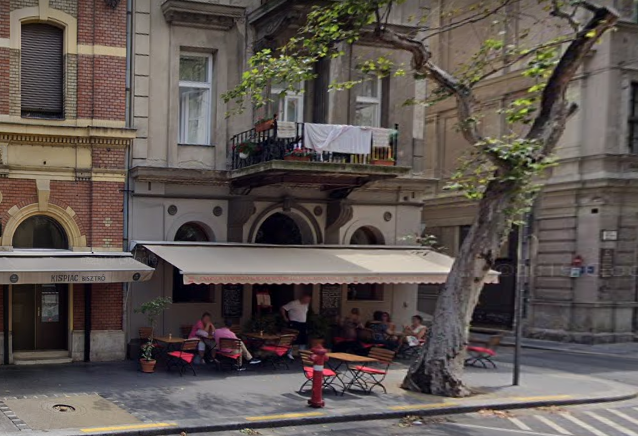
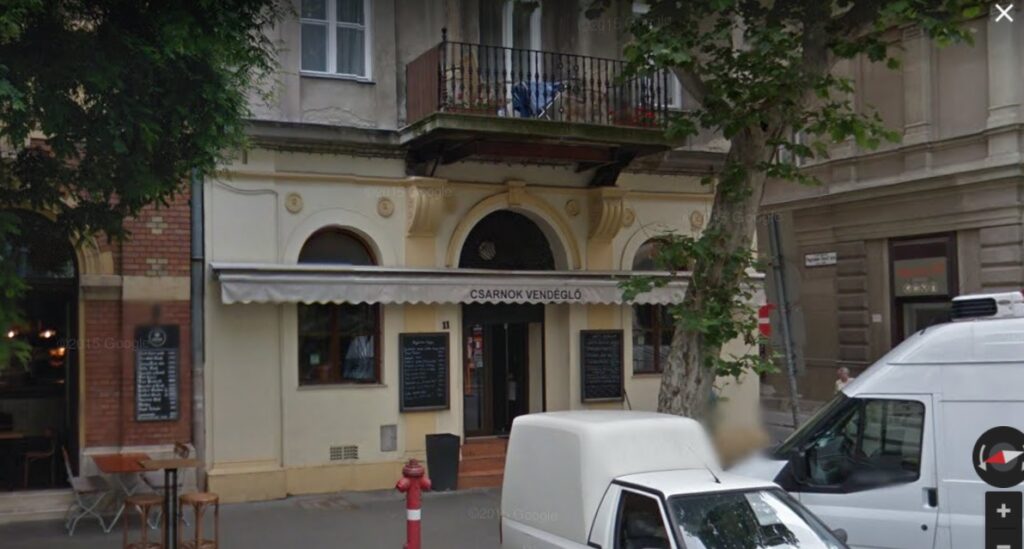
However, the establishment’s status seems less certain in the aftermath of COVID. Here’s a post at Fb, which I believe posits a reopening date…
…which may or may not have occurred. Here is the view from May, 2022.
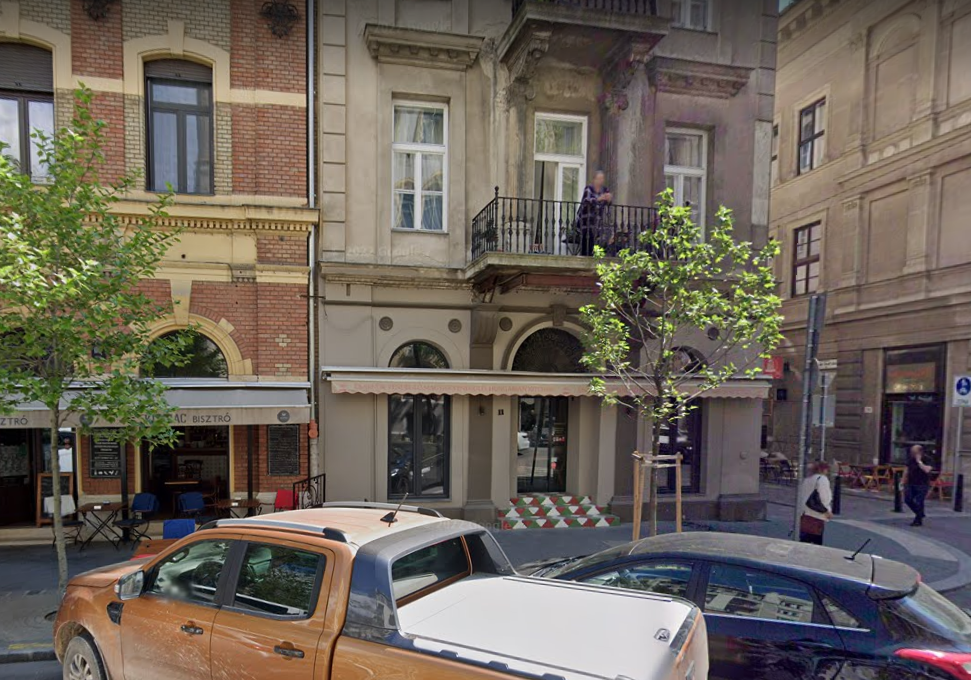
The old tree is gone and a new one planted; however, it isn’t clear whether the eatery has ever returned since the pandemic disruption. There’s a moribund feel to the most recent photo, and internet research is inconclusive.
My point, assuming I actually have one, is that we probably take for granted the longevity of our favorite joints. Czarnok Vendéglő survived plenty of challenges and tumult during its first decade, and kept keeping on. Apparently the establishment was privately owned and operated by the time I visited, and this fact alone is incredible, given the geopolitical context. Unfortunately, all things come to an end.
My only visit in 1987 was memorable, so much so that I took a photo of the exterior, but my exact memories are lamentably scant. The cabbage rolls were sublime, to be sure, and yet my recollection of the beer is highly suspect, as two Americans with minimal language skills tried to deduce the beer served on tap.
Did it say so somewhere? Was there a sign, or a written notation on the menu? Apparently so, because I made note of the beer at the time, so I’m guessing my memory is accurate.
At the end of the day, what does a brief interlude like this one, taking place 36 years ago in a foreign land, really mean?
I’m stumped, though in the noble tradition of refusing to allow pesky facts to ruin a great quote, I’m reminded of what Chinese Premier Zhou Enlai supposedly said in 1972 when asked about the lessons of the French Revolution: “It’s too early to tell.”







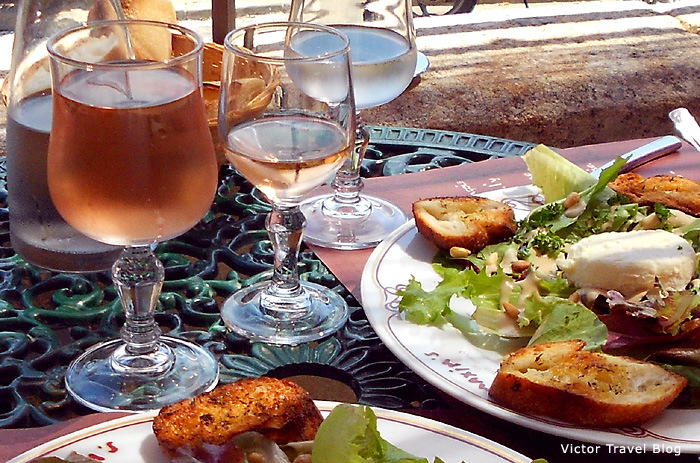









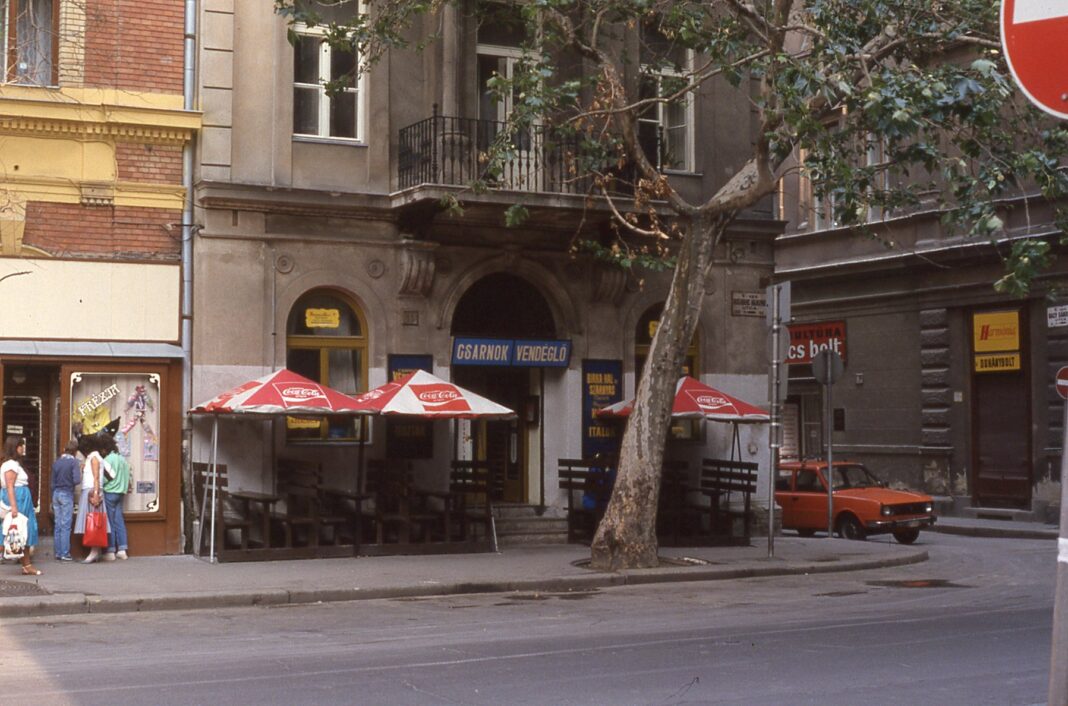
 Roger Baylor is an entrepreneur, educator, and innovator with 40 years of beer business experience in metropolitan Louisville as a bartender, package store clerk, brewery owner, restaurateur, writer, traveler, polemicist, homebrewing club founder, tour operator and all-purpose contrarian.
Roger Baylor is an entrepreneur, educator, and innovator with 40 years of beer business experience in metropolitan Louisville as a bartender, package store clerk, brewery owner, restaurateur, writer, traveler, polemicist, homebrewing club founder, tour operator and all-purpose contrarian.



